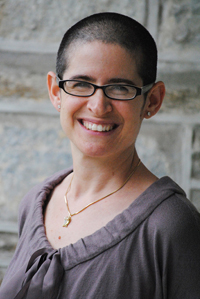By Elana Rivel, Associate Director
![]()
Two are Better than One, Ecclesiastes 4:9-12
This quote was written on the front of my bat mitzvah invitation. It was not anything I would be reciting during my ceremony, but it emphasized an important part of who I am – a twin. My brother and I celebrated this milestone together and our parents found a way to further connect who we were to our rich, Jewish tradition. The significance was not lost on me and, in fact, it helped strengthen the lens of how I continue to connect to the world.
I believe that the beauty of the Torah is that while it tells our people’s story, it leaves room for interpretation and understanding so that on any given day, in any given year, we are able to see ourselves in that story.
At Jewish Learning Venture, when you join us in study or conversation, we begin our time together with text. On occasion, we discuss that week’s Torah portion, but more often we look for a less familiar text that people may not have connected to their institutional work. We want to encourage each person to read the text through his/her own lens and to imagine how that text relates to the work we are about to do together (always emphasizing that there are no wrong answers!). I am always interested to hear others’ interpretation – it is a way for me to understand where an individual may be coming from in that moment. I believe that by starting our work together this way allows each of us to frame the work that we are committing to, and it opens the door to deeper conversation.
There is an exercise we sometimes do with communal volunteers where we ask them to choose from a range of quotes, from a range of Jewish sources, the one that should be a “Community Car Magnet”– what message would they want for every member of the community to put on their car and, if it would be followed, what would it mean for the community.
Which quote would you pick (one of these or another?) and why?
If a person resides in a town for thirty days, that person is responsible for continuing the soup kitchen; after three months, that person is responsible to the charity box; after six months, to the clothing fund; after nine months, to the burial fund; and after twelve months, that person is responsible for contributing to the repair of the town walls.
– Talmud Baba Batra, page 8a
The world rests on three things: On Torah, on Worship and on acts of Lovingkindness.
– Pirkei Avot (Ethics of our Fathers) 1:2



